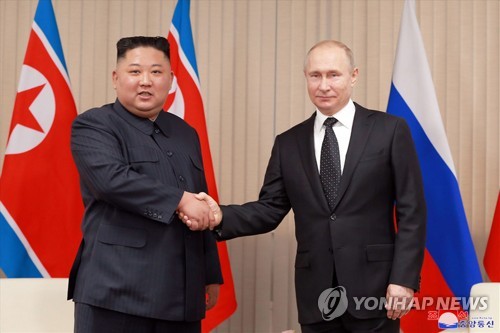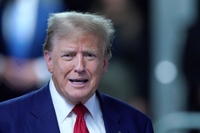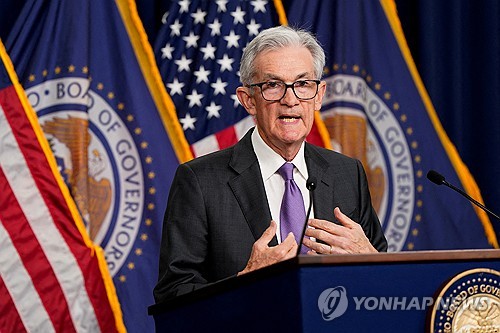(LEAD) S. Korea to encourage yuan transactions, set up settlement infrastructure
(ATTN: UPDATES with more details, comments throughout)
SEOUL, Oct. 31 (Yonhap) -- South Korea will encourage businesses to use the Chinese yuan for trade and build the necessary infrastructure to clear and settle accounts with the currency, the government said Friday.
In a meeting of economic policymakers that included representatives from the central bank and the Financial Services Commission, the finance ministry said the goal is to use the yuan as a medium of exchange for up to 20 percent of all South Korea-China commercial transactions in the long term, up from just 1.2 percent in 2013.
Last year, South Korea's trade with China reached US$229 billion, an increase from $215.8 billion tallied the year before. Of all trade, roughly 95 percent of bilateral trade is carried out with the U.S. dollar that requires currency transactions between the Korean won, the yuan and the greenback.
This arrangement exposes traders to foreign exchange risks and transaction costs for companies that have extensive business relations with China.
The ministry stressed that encouraging yuan transaction is critical for a steady supply of the currency that can allow it to be utilized for settlement, investment and stable foreign exchange.
It also said Seoul wants to become the third-largest overseas market of yuan-based financial assets including bonds, derivatives and savings in the long-run.
Asia's fourth-largest economy said it will create a direct currency transaction market between South Korean and Chinese banks in December. Institutions will be designated as market developers who are tasked with setting prices of currency exchanges and supplying funds.
Global trade carried out in the yuan has ballooned from 2.06 trillion yuan in 2012 to 3.1 trillion yuan last year, and 2.9 trillion yuan in the first half of 2014.
"The goal is to move quickly to amass financial assets marked in the Chinese currency and even use the yuan as a reserve currency," the finance ministry said. The latter could entail issuing yuan-based foreign exchange stabilization bonds.
To get companies to use the yuan more frequently for trade, policymakers will push for preferential export insurance coverage to deal with any foreign exchange-related losses in the payment process.
"Maximum trade insurance coverage will be set 5-20 percent higher than other policies," the finance ministry said.
The government will, moreover, support banks handling the yuan as a medium of settlement and meet with companies that have business ties with China so that they are kept abreast of the benefits and initial safeguard measures.
Creating yuan-based transactions can lead to more trade since many companies in the interior of China, where the dollar is hard to come by, have been reluctant to set up trade with South Korean companies.
To provide infrastructure, the government said it will fully support operations of China's Bank of Communications Seoul branch, which is currently the clearance bank for yuan-based commercial transactions.
The government will also open new opportunities for South Korean firms to invest in China's asset market through Renminbi Qualified Foreign Institutional Investors, the China Interbank Bond Market (CIBM) and other authorized institutions.
"Consultations with Beijing will be carried out to allow more investments in CIBM," the ministry said.
The latest move comes after the leaders of the two countries agreed on July 3 to expand usage of the yuan for trade.
Seoul in March had announced it wants to set up a direct won-yuan exchange market as part of its three-year economic reform policy plan.
yonngong@yna.co.kr
(END)
-
 BTS' RM to prerelease a track of 2nd solo album
BTS' RM to prerelease a track of 2nd solo album -
 BTS' Jungkook's 'Seven' chosen as hottest hit outside U.S.
BTS' Jungkook's 'Seven' chosen as hottest hit outside U.S. -
 'Queen of Tears' weaves rich tapestry of Korean contemporary art
'Queen of Tears' weaves rich tapestry of Korean contemporary art -
 From pastime to academic discipline: Exhibition spotlights evolution of Korean embroidery
From pastime to academic discipline: Exhibition spotlights evolution of Korean embroidery -
 Indonesia coach left with mixed feelings after eliminating native S. Korea in Olympic football qualifiers
Indonesia coach left with mixed feelings after eliminating native S. Korea in Olympic football qualifiers
-
 'Queen of Tears' weaves rich tapestry of Korean contemporary art
'Queen of Tears' weaves rich tapestry of Korean contemporary art -
 From pastime to academic discipline: Exhibition spotlights evolution of Korean embroidery
From pastime to academic discipline: Exhibition spotlights evolution of Korean embroidery -
 BTS' RM to prerelease a track of 2nd solo album
BTS' RM to prerelease a track of 2nd solo album -
 BTS' Jungkook's 'Seven' chosen as hottest hit outside U.S.
BTS' Jungkook's 'Seven' chosen as hottest hit outside U.S. -
 N. Korea touts ties with Russia on Kim-Putin summit anniversary
N. Korea touts ties with Russia on Kim-Putin summit anniversary
-
 Trump suggests U.S. could withdraw its troops if S. Korea does not contribute more to support USFK: TIME
Trump suggests U.S. could withdraw its troops if S. Korea does not contribute more to support USFK: TIME -
 BTS' Jungkook's 'Seven' chosen as hottest hit outside U.S.
BTS' Jungkook's 'Seven' chosen as hottest hit outside U.S. -
 N. Korea becoming 'more confident' due to its ties with Russia: Pentagon chief
N. Korea becoming 'more confident' due to its ties with Russia: Pentagon chief -
 S. Korea, Australia to hold 2+2 talks of defense, foreign ministers
S. Korea, Australia to hold 2+2 talks of defense, foreign ministers -
 (LEAD) S. Korea discussed possible participation in AUKUS Pillar 2 with Australia: defense minister
(LEAD) S. Korea discussed possible participation in AUKUS Pillar 2 with Australia: defense minister



















